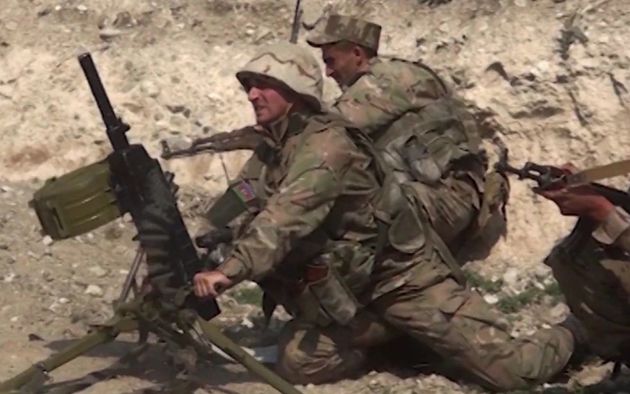Exactly a year ago, on September 27, 2020, Azerbaijan's Patriotic War began. On that day, Armenia's occupying forces subjected the positions of the armed forces of Azerbaijan along the front line and the adjacent populated areas in Azerbaijan to intensive fire with the use of large-calibre weapons, artillery and mortars. Baku decided to launch a counter-offensive operation to ensure the safety of the civilian population. Vestnik Kavkaza offers its readers to follow the events of the 44 days of Azerbaijan's Patriotic War as they were covered a year ago.
On the war's second day, September 28, the fighting that had begun the day before continued throughout the night. U.S. presidential candidate Joe Biden called on the parties for urgent de-escalation, while incumbent President Donald Trump said he was closely following the situation.
By two o'clock in the morning it became known that the occupying forces had lost over 500 people in the battles for the Talish village in the Tertar-Agdam direction. In Armenia, clinics have stopped scheduled admission of patients due to the influx of wounded from the occupation zone. The Azerbaijani Defense Ministry continued to publish videos showing the destruction of military equipment of the invaders, including tanks.
In response, Armenian forces began shelling the town of Terter. By 9:00, the key heights around Talish were liberated, the defeat of the invaders in this sector of the front was inevitable. The Italian Senate condemned Armenia's aggression against Azerbaijan; Turkey called on the whole world to do the same.
Partial mobilization was announced against the backdrop of the growing scale of hostilities in Azerbaijan. At about 10:00, the first negotiations were held between Azerbaijani President Ilham Aliyev and French President Emmanuel Macron, who showed open support to the occupying force. The first action in support of the liberation operation of the Azerbaijani army was held in Istanbul.
During adviser to President of Azerbaijan Hikmet Hajiyev's speech the words "Azerbaijan's Patriotic War" were heard for the first time. A number of airlines, including Aeroflot, canceled flights to Baku.
By 12:00, it was revealed that Armenia has been using foreign mercenaries - ethnic Armenians from Syria and other countries of the Middle East. Due to the liberation of Murovdag Mountain, Armenia banned entry to the occupied Kalbajar region, since the only road was now under the control of the Azerbaijani Armed Forces. The continued shelling of the front-line Azerbaijani settlements lead to new casualties among the peaceful Azerbaijani population.
One of the Azerbaijani bloggers demonstrated the permeability of the occupation infrastructure by infiltrating Khankendi. After 13:00, the Kremlin called on all parties to the conflict for maximum restraint, the Federation Council expressed fears of the expansion of hostilities beyond the borders of Azerbaijan and the use of the Karabakh war by the United States for its own purposes. At the same time, it became known about the mass desertion in the occupying forces of Armenia, the Armenian Ministry of Defense acknowledged the death of another 59 invaders.
After 15:00, the occupying forces of Armenia began to retreat in the Terter-Agdam direction to Agdere. Yerevan began to work out a plan for the complete evacuation of the occupants, separatists and illegal settlers from the territories of Azerbaijan. Armenian President Armen Sarkissian for the first time proposed to stop the war. Joshua Kucera, a well-known American expert who specializes in security issues in the Caucasus and the Middle East, noted that Azerbaijan is righting a deep injustice. Saudi Arabia called for the implementation of the UN Security Council resolutions on the de-occupation of Azerbaijani land, and the Organization of Islamic Cooperation demanded that Armenia withdraw the occupation troops from Azerbaijan.
By 17:00, the number of civilians killed in shelling attacks in Terter reached 26 people, an hour later two more local residents were killed there. Peaceful villages in the Goranboy region of Azerbaijan came under fire from the Armenian occupation army, infrastructure was damaged in a number of regions due to artillery strikes.
After 19:00, UN Secretary General Antonio Guterres fulfilled yesterday's promise and held talks with Ilham Aliyev, closer to midnight he phoned Armenian Prime Minister Nikol Pashinyan. The UN Security Council has begun preparations for a meeting on the Karabakh war. Ankara stressed that it will not send its military to the war zone.
The Armenian Defense Ministry confirmed a large-scale counteroffensive by the Azerbaijani army along the Araz River in the south of the occupation zone and in the direction of Talish and Sugovushan villages in the northeast. Azerbaijan published a video confirmation of the proximity of the liberation of the Talish village and denied the fake news about the downed plane. In light of the difficult situation at the front, the Armenian government banned male citizens from leaving the republic; statements were also made about the insignificance of losses in strategic heights.
At the end of the day, the representative of Iran's Supreme Leader Ali Khamenei expressed hope that Azerbaijan will completely liberate its territories.
Thus, on the second day of the war, the Azerbaijani army advanced along the Araz River deep into the occupied territories and came close to the villages of Talish and Sugovushan. The supply of the occupying troops along the main road through Kelbajar was completely blocked due to control over the Murovdag mountain. The shelling of peaceful Azerbaijani cities and villages in the front-line region has intensified.






